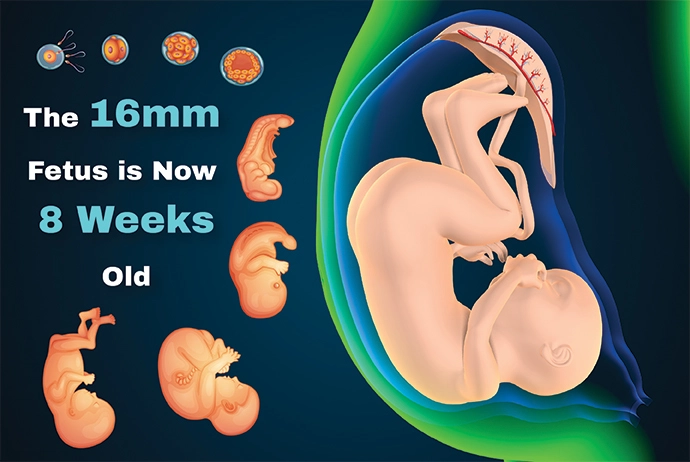
Dr. Aruna Ashok MBBS, MS OG, DNB OG
- Clinical Director

Your baby at 8 weeks is about the size of a raspberry, measuring around 16mm from head to bottom. This is a significant time in fetal development. The embryo is growing rapidly, and vital organs are beginning to form. Your baby's heart is beating steadily, and you may even see it flickering on an ultrasound.
This week, your baby’s facial features are becoming more defined. The eyes have formed underneath a thin layer of skin, and the tip of the nose is starting to show. Small arms and legs are growing longer. And, small hands and feet are beginning to appear. Fingers and toes will also be starting to develop. This is although they’re still webbed.
The brain is also undergoing critical changes. Neural pathways are forming, and the brain is dividing into different sections. This is a crucial time for your baby’s nervous system, as it lays the foundation for future development. Additionally, the intestines are starting to develop, and the beginnings of the respiratory system are forming.
As you look at the ultrasound, it’s fascinating to think about how much your baby has grown in such a short time. Each week brings new and exciting developments. Knowing what’s happening inside can help you feel more connected to your baby. Have you noticed how amazing it is that so much is happening, even though you can’t see it? It’s like a tiny miracle unfolding inside you.


At 8 weeks pregnant, you might be experiencing a variety of symptoms. One common symptom is morning sickness, which can occur at any time of the day. This nausea is due to the increased levels of hormones in your body. Make sure to eat in small quantities and frequent meals. This can help manage this discomfort.
You might also notice fatigue. Your body is working hard to support your baby’s development, which can leave you feeling exhausted. It’s important to listen to your body and get plenty of rest. Another common symptom is breast tenderness. Your breasts are preparing for breastfeeding, and the increased blood flow can cause them to feel sore and sensitive.
Frequent urination is another symptom you might experience. This is mainly because of the amplified blood flow. This goes to your pelvic area and the growing uterus pressing on your bladder. You might also notice mood swings. Hormonal changes can affect your emotions, causing you to feel happy one moment and weepy the next.
Despite these symptoms, remember that they are signs your body is adapting to support your growing baby. Each symptom is a reminder of the amazing journey you’re on. Have you found any strategies that help you cope with these symptoms? Sometimes, sharing tips with other pregnant women can make a big difference.
Eating well is crucial during pregnancy. At 8 weeks, focusing on a balanced diet can help support your baby’s development and your own well-being. Start with folate-rich foods like leafy greens, beans, and fortified cereals. Folate is essential for your baby’s neural tube development.
Protein is also important. Include lean meats, poultry, fish, eggs, and dairy in your diet. If you’re vegetarian or vegan, beans, lentils, tofu, and nuts are great alternatives. Protein helps with the growth of your baby’s tissues and organs.
Calcium is another key nutrient. It helps in the development of your baby’s bones and teeth. Dairy products like milk, cheese, and yogurt are excellent sources of calcium. If you’re lactose intolerant or prefer non-dairy options, fortified plant-based milks and leafy greens can provide the calcium you need.
Don’t forget about iron. Iron-rich foods like red meat, spinach, and fortified cereals help prevent anemia and support your baby’s blood supply. Vitamin C can help your body absorb iron, so include fruits like oranges, strawberries, and kiwi in your diet.
Eating small, frequent meals can help manage nausea and keep your energy levels up. Have you found any favorite pregnancy-friendly recipes? Sharing meal ideas with others can make healthy eating more enjoyable and less of a chore.
Pregnancy can be an emotional rollercoaster. At 8 weeks, seeking counseling can be beneficial. It provides a space to discuss your feelings and concerns with a professional. This is especially important if you’re feeling overwhelmed or anxious about your pregnancy.
Counseling can help you manage stress. Techniques like deep breathing, mindfulness, and positive visualization can be useful. A counselor can guide you through these practices and help you find what works best for you. They can also provide support in dealing with any relationship changes. Pregnancy can bring about shifts in your relationships with your partner, family, and friends. Discussing these changes with a counselor can help you navigate them more smoothly.
Joining a support group can also be beneficial. Connecting with other pregnant women who are experiencing similar emotions and challenges can provide a sense of community. You can share experiences, offer advice, and support each other.
Remember, taking care of your mental health is just as important as taking care of your physical health. Have you considered what kind of support might be most helpful for you during this time? Sometimes, just knowing there are resources available can provide a sense of comfort.
At 8 weeks pregnant, your healthcare provider may recommend several tests to ensure your pregnancy is progressing well. One common test is an ultrasound. This helps confirm your due date, check the baby’s heartbeat, and ensure the pregnancy is developing as expected.
Blood tests are also common. These tests can check your blood type, Rh factor, and screen for anemia. They can also check your immunity to certain infections like rubella. Additionally, blood tests can screen for certain genetic conditions and chromosomal abnormalities.
Urine tests may be performed to check for urinary tract infections, which are common during pregnancy. These tests can also check for proteins and sugars that could indicate preeclampsia or gestational diabetes.
Your doctor may also recommend a pap smear if you haven’t had one recently. This test checks for cervical abnormalities and infections like HPV, which can be important for your health and the health of your baby.
Discussing these tests with your healthcare provider can help you understand their importance and what to expect. Have you talked to your doctor about what tests you might need? It’s always good to ask questions and stay informed about your pregnancy care.
At A4 Fertility Centre, we understand that pregnancy is a unique and transformative journey. To support you through every stage, we offer comprehensive birthing classes designed to provide you with the knowledge, skills, and confidence needed for a healthy and positive pregnancy experience. These classes cover a wide range of topics, ensuring you are well-prepared for the exciting months ahead.
One of the primary focuses of our birthing classes is nutrition. Proper nutrition is essential for the health of both mother and baby. Our classes provide detailed information on what to eat and what to avoid during pregnancy. We cover the importance of essential nutrients such as folic acid, iron, calcium, and protein.
You will learn how to create balanced meal plans. These plans support your baby's growth and development. They also meet your own nutritional needs. Our expert dietitians will guide you. They will guide you through healthy eating habits. They will provide practical tips. These tips help manage common pregnancy-related dietary challenges. Challenges like nausea and food aversions.
Labor and delivery are also central components of our birthing classes. Understanding the stages of labor, pain management techniques, and what to expect during delivery can significantly reduce anxiety and help you feel more in control. Our experienced midwives and obstetricians will explain the different phases of labor, including early labor, active labor, and the transition phase. We cover various pain relief options, from natural methods like breathing exercises and hydrotherapy to medical interventions such as epidurals. Additionally, we provide information on birthing positions, the role of your birth partner, and what to expect in the delivery room.
Our birthing classes also emphasize the importance of physical and mental well-being during pregnancy. We offer prenatal yoga and exercise sessions tailored to different stages of pregnancy, helping you stay active and comfortable.
Regular exercise can improve your stamina, reduce pregnancy-related discomforts, and promote a faster recovery postpartum. Mental health is equally important, and our classes include sessions on relaxation techniques, stress management, and mindfulness practices. These tools can help you maintain a positive mindset and cope with the emotional ups and downs of pregnancy.
Another key aspect of our birthing classes is breastfeeding education. Breastfeeding has numerous benefits for both mother and baby, but it can sometimes be challenging.
Our lactation consultants provide hands-on guidance and support, covering topics such as latch techniques, feeding positions, and how to establish a good milk supply. You will also learn about common breastfeeding issues and how to address them effectively.
Postpartum care is an integral part of our program as well. The weeks and months following childbirth can be both joyous and challenging. Our classes prepare you for this transition by discussing what to expect in the postpartum period, including physical recovery, emotional changes, and newborn care.
You will learn about postpartum exercises, nutrition, and strategies for managing sleep deprivation and other common issues. We also offer guidance on how to balance self-care with caring for your new baby.
Community and support are vital during pregnancy and beyond. Our birthing classes provide a space to connect with other expectant parents who are going through similar experiences. Building a support network can be invaluable, offering friendship, encouragement, and shared wisdom. Our classes foster a sense of community, allowing you to share your journey with others and gain support from those who understand what you are going through.
At A4 Fertility Centre, we are dedicated to ensuring that you have the best possible pregnancy experience. Our comprehensive birthing classes are designed to empower you with the knowledge and confidence you need to navigate this incredible journey. Have you considered enrolling in a birthing class? It can be a great way to prepare for the exciting months ahead and ensure that you and your baby have a healthy and positive start.